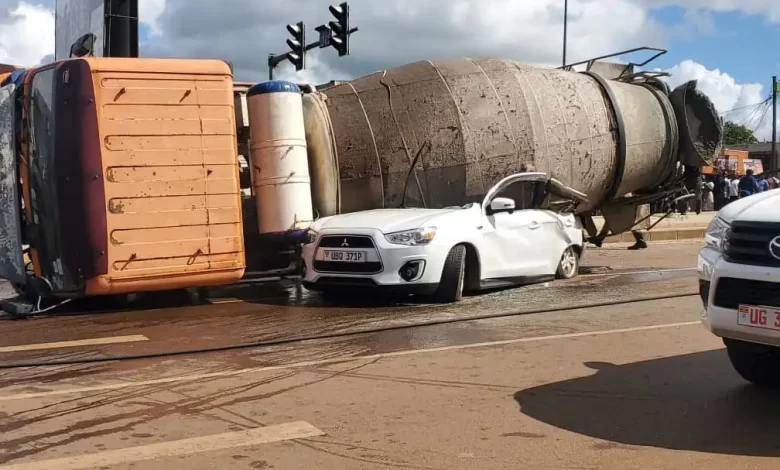Nkumba accident sparks controversy over Vehicle Inspection Project
According to CCTV footage released by police, the cement mixer truck is seen losing control before crashing into the road barriers and then falling on top of the Mitsubishi car.

Ronald Amanyire the Principal Road Safety Officer at the Ministry of Works and Transport has raised concern regarding motor vehicle inspection in Uganda, saying that more Ugandans will continue to die in case this isn’t worked on, especially on commercial vehicles.
He made the remarks on his official X account regarding an accident that happened at Nkumba Traffic lights, off Entebbe Expressway.
The accident at Nkumba happened on Wednesday, April 17, 2024, when a concrete mixer truck number UAN 836D lost control and rammed into a parked Mitsubishi RVR car number UBQ 371P.
According to CCTV footage released by police, the cement mixer truck is seen losing control before crashing into the road barriers and then falling on top of the Mitsubishi car.
The driver of the Mitsubishi car is believed to have died on the spot while eyewitnesses say the driver of the truck was seen running to a nearby medical centre for treatment.
According to the 2022 Uganda Police Force (UPF) annual report, the country registered 20, 394 cases of road accidents in 2022 compared to 17,443 registered the previous year. Out of every 100 crashes, 22 people died while 61 percent of all accidents were a result of reckless driving.
Amanyire revealed that he was castigated because of promoting the SGS motor vehicle inspection project, which was aimed at inspecting vehicles on Ugandan roads every 6 months.
Assuming brake failure was the cause of the accident at Nkumba, he believes that if the contract and regulations for this project were maintained, all commercial vehicles such as the truck that caused the accident would be inspected every six months.
“Such commercial vehicles are constantly on the road as opposed to private vehicles, which you park, go to your offices or markets and work, then drive home in the evening. This was a project in which the government had not invested a single shilling,” said Amanyire.
He further noted that the parliamentary committee of physical infrastructure made wild accusations against him among other Ministry Staff.
“The IGG investigated me without my knowledge because of this project. Staff within the Ministry of Works stabbed me in the back, and yet they should have known better.” he exclaimed,” he said.
Amanyire stressed that inspecting a motor vehicle to determine whether its braking system is functioning according to the required standards, has nothing to do with the vehicle’s age.
He wonders how the “elite” in the country oppose periodic motor vehicle inspection, yet they know it takes place in all countries with good road safety records.
“They have traveled to and lived in these countries. Just because a small man like me could help them extort Billions from SGS, they made me a target of their venom. Cabinet canceled the Contract because of this back and forth with Parliament,” he added.
He believes that in this project, parliament’s role would have come in after the project had been audited, however, this failed hence Ugandans now are paying Shs100 Shillings in compensation.
Regarding the Ministry of Works not following the right procedures at the time of the project, Amanyire explained that the adverts for these services were published in September 2009, evaluation was completed in January 2010 and administrative reviews, among others, were conducted by both the Ministry and Public procurement and disposal of public assets authority (PPDA) in 2010.
Despite dismissing the complaints of the petitioner, the Public Procurement and Disposal of Public Assets Authority (PPDA) recommended cancellation of the procurement process. However, SGS won the case after petitioning the High Court.
“Public Procurement and Disposal of Public Assets Authority (PPDA) appealed. They withdrew their appeal in 2014. The Ministry of Works conducted due diligence and signed the Contract on 15 March 2015. We are in 2024 so for 13 years, intrigue, inefficiencies, and corruption tendencies failed the project. Then the Cabinet canceled the whole process,” he noted.
Conclusively, Amanyire believes that to some extent accidents caused by commercial vehicles may not be due to their oldness, but failure to carry out inspections in an estimated period of six months.







